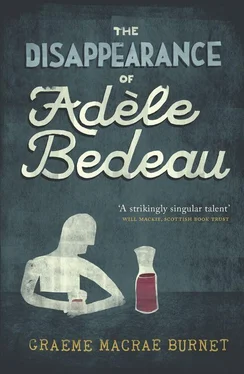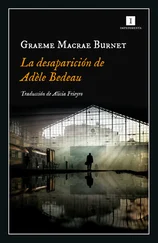Manfred spent his lunch wondering whether he should mention to Pasteur that he would not be in that evening. His absence would be noted and likely become the subject of speculation. He imagined Lemerre holding forth about how he was probably off stalking the waitresses of another bar or how, on account of being mixed up in the disappearance of Adèle, he was now ashamed to show his face. And then the following evening, he would have to endure his jibes about how he was now too good for the Restaurant de la Cloche: ‘Got better things to do with yourself, have you, Swiss?’ It was better to lay the groundwork beforehand. When he was paying his bill at the counter, Pasteur muttered, ‘See you later.’
Manfred grasped the opportunity. ‘Actually,’ he said, ‘I don’t think I’ll be in tonight.’
He lingered at the counter for a moment, waiting for the proprietor to react. Pasteur counted the coins from the silver salver into the till and then looked up as if to enquire why he was still there. Manfred wondered if he had heard him.
‘See you tomorrow, then,’ Pasteur said eventually.
Manfred nodded and left. The afternoon passed slowly. He left the bank at five and hurried home. He took a shower and shaved for the second time that day, a white towel wrapped around his waist. Then he examined his face in the bathroom mirror for any stray whiskers and clipped his nasal hair with a pair of scissors he kept in the bathroom cabinet for this purpose. He splashed his face with cold water and patted it dry before applying cologne. Manfred prided himself on his fastidious personal hygiene. On more than one occasion, a girl at Simone’s had remarked that he smelled nice. He was not such a bad-looking chap. Was it so implausible that Alice Tarrou would find him attractive?
Manfred returned to his bedroom and dressed. Once a year Manfred bought himself a new suit from the same tailor’s in Mulhouse that he had visited with his grandmother as a teenager. M. Boulot invariably greeted him with great warmth and enquired after the wellbeing of his grandparents. In earlier years, he would inform Manfred of the latest trends, but Manfred was not interested and insisted on the same cut and colour as he always had. As a result the rail of suits in Manfred’s wardrobe were all but identical, distinguishable only through subtle variations in the fabric. There was no need for Manfred to go on acquiring new suits — he had more than enough to last him a lifetime — but he continued to make his annual pilgrimage to M. Boulot’s out of loyalty. In a similar way, the rack on the back of the wardrobe door consisted almost entirely of black ties of a narrow girth, enlivened by a few of bolder colours. These were gifts from his grandmother, which Manfred would occasionally wear to Sunday lunch in order to please her, but remove immediately after he left the house. Such gaudy accessories made him feel like a ridiculous dandy. He had no wish to attract comments on his dress. Nor did he wish to have to think about what he would wear on such-and-such a day. His only concession to casual dress was to loosen his tie a little and undo the top button of his shirt at the end of the working day.
He sat at the kitchen table. Now, in fresh clothes, he felt a little more relaxed about the impending encounter. What, after all, could really go wrong? It was not yet six o’clock. He planned to arrive early to accustom himself to his surroundings before Alice arrived, but he still had the best part of an hour to kill. He found a notebook and began to write a list of possible topics of conversation. Manfred was not in the habit of asking personal questions, but he was aware that on occasions such as these it was regarded as normal practice. Indeed, were he not to ask Alice some questions about herself, she might think that he was the sort of egoist who only wished to talk about himself, something which could not be further from the truth. He tapped his pencil on the piece of paper and wrote the word Work . It was dull, but work was a perfectly acceptable topic. Alice had already asked him what he did for a living. He would merely be reciprocating. Indeed, if he did not ask, Alice might think that he was a chauvinist who thought women were only fit to be housewives. Or whores. He tried to think of ways in which he might phrase a question: So, Alice, what do you do for a living? What line of work are you in ? As he rehearsed the words in his head, they sounded quite absurd, as if he were interviewing a prospective employee. He crumpled up the paper and threw it on the floor. What was he going to do, take it out of his pocket and consult it at the dinner table? He was sure to make a fool of himself. He should never have agreed to this stupid date in the first place. The more he thought about it, the more he was not even sure if he liked Alice Tarrou. She was offhand and supercilious. And clearly she was someone who was used to getting her own way. He had foolishly allowed himself to be flattered by her attention, but he had no wish to be drawn into any entanglements. He was quite content with his life the way it was. If he lived the way he did, it was because that was how he wanted to live. He had no desire to change anything. The date had been a mistake. There was no question of cancelling, but he could easily and quite politely make it quite clear that he had no interest in becoming more deeply involved.
Manfred arrived at the restaurant on Avenue de Bâle at ten to seven. He had walked the back way alongside the railway line to avoid being spotted by any of the regulars of the La Cloche. The restaurant was housed in a traditional oak-beamed building. Inside, the dining room was low-ceilinged, but surprisingly large. The walls were panelled with dark wood and fitted with brass light fittings, which emitted a yellowish light. A number of oversized pot plants stood like sentries next to the various doors. The tables were covered with starched white cloths and laid with an intimidating array of cutlery and glasses. Only two other tables were occupied. Manfred was shown to a table in the centre of the room. He explained to the waiter that he was expecting someone and asked for a glass of wine.
Manfred recognised a man at one of the other tables. He was in the construction trade and over the years had had occasional business with the bank. He acknowledged Manfred with a little bow of his head. He was with a woman and they were chatting animatedly. The man talked with his mouth full and pointed his knife at his dining companion — for some reason Manfred did not think she was his wife — who did not seem to notice his ill manners. The other table was occupied by a solitary man in a suit; probably, Manfred thought, a salesman passing through town. He had a paperback open on the table in front of him and kept his eyes fixed on the pages. Manfred wished he had asked to be seated elsewhere. He felt like an exhibit in a museum. His wine arrived. He assumed that Alice would be late and downed it in a couple of swallows before ordering a second.
Alice arrived on the stroke of seven o’clock. She was wearing a knee-length grey wool dress, fastened around her waist with a thick brown leather belt. The waiter took her coat and showed her to the table. Manfred stood up and held out his hand.
‘Good evening,’ he said.
Alice ignored his hand and kissed him on both cheeks, placing her hands on his upper arms as she did so. Manfred inhaled her perfume. It was dry and earthy like the floor of a forest before a fire. She sat down and ordered a Martini without so much as glancing at the waiter.
‘Well,’ she said, ‘here we are.’
‘Yes,’ said Manfred. He made himself smile. Alice was wearing pale red lipstick. She pursed her lips and widened her eyes, then glanced around the room. She leaned forward and whispered, ‘It’s like a morgue in here. Maybe we should go somewhere else.’
Читать дальше












